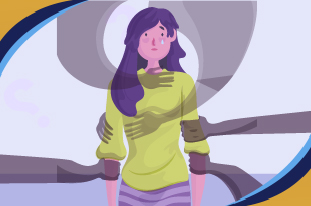It is natural to share a close, trusting bond with your parents. This is a positive and healthy parent-child relationship.
A normal and healthy bond with your parents feels close and safe. It should give you comfort, direction, and love without strings attached.
But what if that connection becomes too close?
What if the lines disappear and you feel like you are carrying all your parents’ emotional weight?
You might be experiencing something called emotional incest. This feeling and support are different from parentification.
The word “ incest” sounds extreme, and that’s on purpose. It refers to a major boundary violation, not a physical one.
It describes a harmful family setup where the parent relies on the child to handle their needs for close friendship and emotional help. A partner should fill these roles, not a kid.
If you feel like you must manage your parents’ feelings, or if you constantly put their stability ahead of your own, then this is for you.
You need to name this unhealthy parent-child dynamic where the adult relies on the child to meet their needs for intimacy, friendship, and emotional support. Recognizing and knowing about the problem is the major step toward getting out of that feeling and finally creating a healthy, grown-up relationship.
When “Closeness” Hides a Life’s Problem
The relationship you grew up in likely felt normal. It started early and quietly, which makes it nearly impossible for you to see anything wrong with it.
Many people who experience this look back on their childhood and think of themselves as “the mature one” or “the confidante” in their family. They mistake this closeness for a deep love. The truth is that a close bond signaled a major break in the family rules. Or you can say, breach of familial boundaries. The parent treated their child like a friend, an emotional equal, or even a substitute for a spouse. We call this emotional incest.
The Price Of Role Reversal In Emotional Incest
When this occurs, the child’s emotional development stops progressing normally. They sacrifice their own feelings, emotional development, and needs because their main job becomes taking care of their parents. The child becomes emotionally incestuous.
This role reversal – where the child acts like a caretaker- has a specific name, called parentification. It steals, robs a person’s childhood. It puts a huge, unfair, inappropriate burden on young shoulders and takes away the chance of simply being a child.
Is Emotional Incest Called Covert Incest?
It may be intense, but emotional incest, sometimes called covert incest. This exists when parents try to get their emotional needs and satisfaction from their child when they should turn to another adult.
This dynamic does not require physical contact. It does deep emotional damage to a child by stepping on the child’s right to an independent emotional life.
The Key Signs to Look For
This harmful triangulation pattern shows up in a few clear ways: 
The Child Becomes An Adult. The child takes on the job of the family listener, and they learn about the adult world, their behaviors, thoughts, and emotions. So they become emotional rock. They hear about marriage problems, money worries, or parents. Worst fears. They carry a burden too heavy for them, and parents are not aware of that weight.
The Emotional Blurring / Enmeshment: The family structure lacks clear emotional boundaries. The parent and child feel like they share one single emotional identity. This makes it difficult for a child to figure out who they are outside of their parents. They never get to form their own self.
The Parent Needs the Child: The parent relies on the child for self-worth, feeling good about themselves, and staying happy.
If the child tries to pull away, live their own life, or seek independence, the parent acts guilty, panics, or gets jealous. It’s an emotional trap that keeps the child stuck.
Why Would A Parent Treat Their Child This Way?
You need to understand why this happens. Emotional incest usually does not start because a parent wants to hurt their child.
It often starts with a grown-up who carries a deep, hidden pain.
Maybe the parent is dealing with severe loneliness or a life problem that they haven’t solved yet. They might struggle with depression, anxiety, or an addiction. Maybe their marriage is cold, unhappy, or distant. They feel completely alone and unloved.
Now, instead of finding help where they should, from adult sources, like therapists, a spouse, or an adult family member, they unconsciously turn to their child.
Why? Because the child is right there. A child listens without judgment. The child is a captivating audience, a safe place, and there is someone who loves without condition.
This creates a powerful, though entirely unhealthy connection. The parent finally feels seen, comforted, and validated. They get what they need. It is the child who has to face this for their entire life.
The child, however, pays the ultimate price; they lose their childhood, tender, untouched feelings, emotions, mischief, careless life, and enter into adult life, full of worries and emotions.
They lose their chance to just be a kid because they spend all their energy giving emotional support to the person who needs support.
Read More: Recognizing the Signs of Emotional Manipulation
The Constant Alert Turns Into Trauma
This situation creates a deep, constant wound we call developmental emotional trauma. The child never gets to have a carefree childhood. They live on high alert, always dealing with problems too big for them, like money issues or their parents’ constant fighting.
This burden of adult worries creates chronic anxiety. They feel responsible for things no child can actually control, leaving them in a state of stress that never turns off.
Know About This Simple Truth
Healing from a confusing childhood, the kind where you have to be the parent, is not a quick fix. It’s a complex process that begins with recognizing the truth of the trauma and understanding its full impact. Here is the most important thing you must hold onto: it was not your fault.”

You were a child. You did the best you could with what you had. The truth of the pain, often called “emotional incest,” begins to lift the moment you truly believe this simple fact.
Read More: Feeling hopeless? Top 14 steps to cope with hopelessness
Get Real Professional Help
Look, you can’t fix this mental childhood trauma by yourself. You have to take professional help. You need a guide and support. Find a professional to help. This is the most important thing that you can do. Psychiatrists and therapists provide you with a safe space to work through the mess of your childhood past. Look for experts who focus on childhood trauma and how you can cope with those feelings.
What will this look like?
You meet your younger self: this is called “inner child work”. It helps you connect with the hurt, lonely part of you that didn’t get the care it needed. You learn to get that part of you that it missed.
Attachment-Focused Therapy: This teaches you what secure, healthy relationships feel like and helps you rewire your emotional responses. It is like learning about new feelings. It helps you change the way you react to people so you can build better relationships.
Healing does not mean you have to blame your parents or cut them out of your life. Healing means you recognize the situation clearly. You accept that you were forced to act in that situation, and a completely unfair position, and you finally need to release yourself from that past responsibility.
Read More: Emotional Intelligence (EI) And Its Relationship With Mental Disorders
How Can We Help?
We at Orange Coast Psychiatry have expert psychiatrists and therapists who can recognize your situation better and can provide better therapies and treatment options. If you struggle with associative mental health disorders, we are here to help you deal with complex mental health conditions, including struggles that may have been caused by emotional incest.
Our clinicians use multiple evidence-based therapies with your personalized plans for group or individual therapies. You will also connect with your friends or peers with similar struggles to help you remember that you are not alone.
Call us or contact us for recovery of your mental health disorders. We are present for your services physically or virtually through telepsychiatric services. Besides that, we also work with different major insurance companies to make your mental health a priority.


















